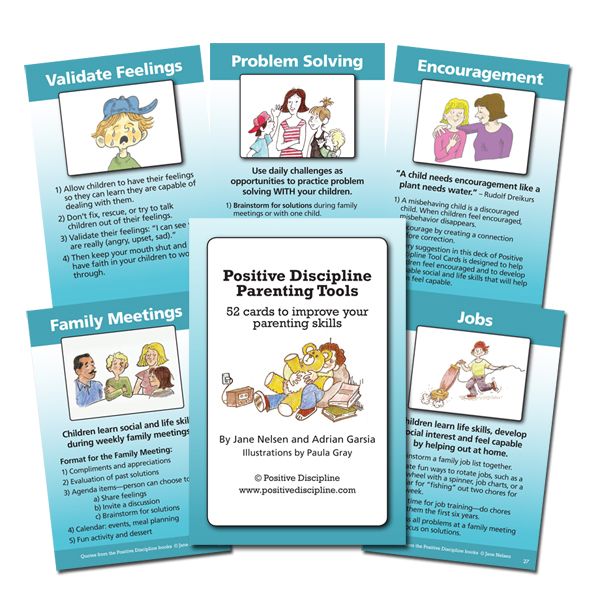
Take the 52 Parenting Tools in 52 Weeks Challenge. This is a fun way to stay focused on Positive Discipline all year long.
We hope you will participate and post comments about your own experiences. It is helpful to get a copy of the Positive Discipline Parenting Tool Cards. You may also want to read a Positive Discipline Book during the year.
The great thing about this challenge is that you can start at any time. It doesn’t matter which week you start with, so jump on in and join the fun! Together we can all improve our parenting skills and improve our relationships with our children. For updates Join Our Email List and our Facebook Group.
Click on the links below to read more about the individual Positive Discipline Tools.
Week 1 – Connection Before Correction
Week 2 – Family Meetings
Week 3 – Kind and Firm
Week 4 – Decide What You Will Do
Week 5 – Limited Choices
Week 6 – Break the Code
Week 7 – Encouragement vs Praise
Week 8 – Listen
Week 9 – Special Time
Week 10 – Routines
Week 11 – Validate Feelings
Week 12 – Take Time for Training
Week 13 – Compliments
Week 14 – Avoid Pampering
Week 15 – Natural Consequences
Week 16 – Teach Children What to Do
Week 17 – Small Steps
Week 18 – Agreements
Week 19 – Follow Through
Week 20 – Jobs
Week 21 – Focus On Solutions
Week 22 – Problem Solving
Week 23 – Logical Consequences
Week 24 – Mistakes
Week 25 – 3 R’s of Recovery
Week 26 – Allowances
Week 27 – Hugs
Week 28 – Wheel of Choice
Week 29 – Act Without Words
Week 30 – Understand the Brain
Week 31 – Back Talk
Week 32 – Winning Cooperation
Week 33 – Positive Time Out
Week 34 – Empower Your Kids
Week 35 – Ask for Help
Week 36 – Curiosity Questions Motivational
Week 37 – Curiosity Questions Conversational
Week 38 – Pay Attention
Week 39 – Put Kids in the Same Boat
Week 40 – Control Your Behavior
Week 41 – Sense of Humor
Week 42 – Limit Screen Time
Week 43 – Letting Go
Week 44 – Closet Listening
Week 45 – Show Faith
Week 46 – Distract & Redirect
Week 47 – Silent Signals
Week 48 – Anger Wheel of Choice
Week 49 – Encouragement
Week 50 – Tone of Voice
Week 51 – Eye to Eye
Week 52 – One Word

No Comments yet!